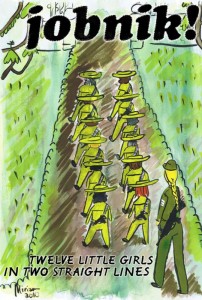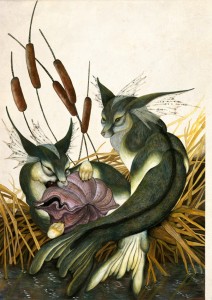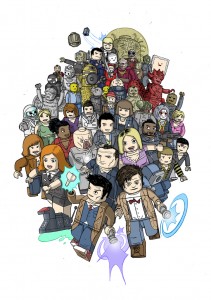Last Saturday, I visited the Small Press Expo in Bethesda, Maryland with three of my friends. We spent nearly all our time wandering around the main convention floor, buying stuff, and occasionally chatting with the exhibitors. Here are some quick thoughts on SPX, in no particular order:
I can’t move!
I hope next year’s Expo rents a second convention room or moves to a larger venue. I’m not sure if they underestimated the crowds or if money is just tight, but the convention floor was far more crowded than it needed to be.
But I’ll give them credit for putting Kate Beaton near a door: she was far and away the most popular cartoonists there (she even put Jaime Hernandez to shame), and the line for her signature formed outside the doorway rather than clogging up the convention room.
There are girls! Reading comics!
And women too. Out of all the (nerd) conventions that I’ve been to, SPX had the largest percentage of both female attendees and exhibitors. This is a very rough estimate, but I’d say close to 50% of the attendees on Saturday afternoon were women.
One of my friends at SPX had previously accompanied me to the Baltimore Comic-con. She found SPX to be much more female-friendly. At the Comic-con, she complained that some of the vendors had stared at her like she was some alien creature. When I asked about it, she told me that what made her feel comfortable at SPX was not the number of female attendees, but the female exhibitors and vendors. In other words, if you want to sell comics to women, you need women who sell comics.
It’s all in the presentation, or lack thereof.
Most of the exhibitors seemed content to put a few books on the table, maybe a print or two, and then wait for the crowds to form. This works fine if the exhibitor is already popular, like Kate Beaton or Jaime Hernandez, but it doesn’t work so well for unknown artists. One of my friends was completely unfamiliar with comics, so she had no idea which artists she might like or what kind of content she was interested in buying. In other words, she’s the ideal consumer for an unknown artist, but they have to make an effort to get her attention. To be fair, some of the exhibitors were more than willing to engage with attendees and explain what their books were about, but others seemed either shy or bored. And in that moment when a potential customer is walking by their table, they need to do more than just sit there and wait for the money to flow in.
She wanted more free samples or excerpts from comics, not just so she could look at the art, but so she’d have a better idea what the comic was about and how well it read. Again, to be fair, a few of the webcomic exhibitors were handing out samples.
Another friend sent me her take on the exhibitors in an email:
“I think the thing I liked most (as someone who isn’t exactly a diehard indie comics fan) was the booths that were selling comics and misc. merchandise based off of the artist’s characters. It was kind of like a comicon meets esty vibe – really neat to see what people came up with. Some of it I thought ‘wow, I could totally make that myself’ (monster scarves) but the wooden puzzle guy and many of the poster/print options were truly impressive.
Overall I very much enjoyed it, mostly for the novelty and the ability to nerd out a bit without feeling like the only girl in the room! :P”
Giving money directly to the artist gives you a warm, fuzzy feeling.
On the other hand, I always feel vaguely guilty when I walk by a table and the artist is just sitting there while no one buys their stuff. It’s a sad scene … until I remember that most of their junk is ridiculously over-priced.
Miriam Libicki seems to be doing well.
But she no longer follows the blog (sorry, Noah).
For those of you new to the Hooded Utilitarian, Miriam used to blog on the site back in its Blogspot days, but she’s far better known as a cartoonist and creator of Jobnik!, an autobiographical account of her time in the Israeli Army.
I bought one of her kitchen magnets and the latest issue of Jobnik!.
I love the cover. I haven’t had a chance to read the comic yet, so I can’t offer a review, but the prior issues were quite good. If you’re interested, it’s available for purchase on her website.
Consumerism, hurray!
What I bought:
Parker: The Hunter, written by Richard Stark and adapted into a comic by Darwyn Cooke. It’s not really all that “indie” (and IDW is hardly a small press) but I like detective stories, I like Cooke’s art, and it was being sold by the Comic Book Legal Defense Fund. Support free speech and all that.
Prison Pit, by Johnny Ryan. Violence and crude humor. ‘Nuff said.
Afrodisiac, by Jim Rugg and Brian Maruca. I love blaxsploitation as much as the next suburban white dude, and this book has gotten positive reviews from most of the critics I follow.
Masterpiece Comics, by R.Sikoryak. It’s an odd but potentially funny idea where classic writers are filtered through the tropes of classic comics.
Locas: The Maggie and Hopey Stories, by Jaime Hernandez. I haven’t read all of Love and Rockets yet, but the Locas storyline is what hooked me on the series (sorry, Gilbert).
Blazing Combat, by Archie Goodwin and assorted artists. Proof that I am susceptible to advertising. They kept running the banner ads for this book on tcj.com, and eventually I succumbed. Though I’ve also been looking for a war comic to review, and this fits the bill.
Pang: The Wandering Shaolin Monk, vol. 1, by Ben Costa. An engaging, cartoony style and a kung fu storyline. But what sold me was that the publisher is named Iron Crotch University Press. Well played, Ben.
What my friends bought:
Trickster, edited by Matt Dembicki with assorted artists. Its a collection of Native American folklore (about Trickster gods, naturally) with each tale illustrated by a different artist. Here’s a blog about the book for the curious.
A print by Emma Rochon, featuring mer-foxy things.
Two prints by Ulises Farinas, including bear-zilla,
and Lego Doctor Who, which efficiently combines two nerdy obsessions.
A large print (couldn’t find an image of it) by Sara L. Turner, author of the webcomic Ghosts of Pineville.
And a pamphlet by Nate Marsh, creator of The Obscure Animal Compendium.





I figured Miriam wasn’t reading any more; she hasn’t commented in an age and day (though I think her sister showed up briefly during the Crumb roundtable?) I’m glad to hear she’s doing well though!
Richard, I enjoyed this post very much: a lively, straightforward account that communicated so much of the pleasure of a con while staying lucid about various shortcomings.
Kate Beaton is near the top of my current favorite cartoonists. So witty, so light!
Miriam was one of the few exhibitors that really had her act together. Unlike certain other artists, she actually had change for a $5!
Thanks for the kind words, Alex.
I wanted to say hi to Beaton and buy some of her stuff, but the line was just too long. And I never really understood the signature fetish that some fans have.
Also, on a random note, she’s tiny.
Are you sure she’s tiny? Perhaps the long line just meant you were seeing her from very far away?
I really like her cartoons too; I wrote this review a while back.
Actually, I know she’s short because I walked right by her on the way to lunch. I had an “OMG a minor celebrity is standing right there!” moment
SPX (sigh) — one of the venues I want to attend someday before I go up to that great drawing board in the sky…
Well, there are other small press/webcomic type expos in other parts of the country.
Did you have any time to make it round to any of the programs/discussions? Those are occasionally interesting.
Minor pedantic point: Those look like Minimates, not LEGO. Still cool.
Love the Jobnik! cover.
I didn’t go to any of the discussions; none of my friends were interested and I couldn’t stick around on my own. I had to drive someone home.
Maybe next year…
Kris- according to Farinas’ website, the print is called Lego Doctor Who.
Pingback: Small Press Expo (SPX) 2010 Con Report » Comics Worth Reading